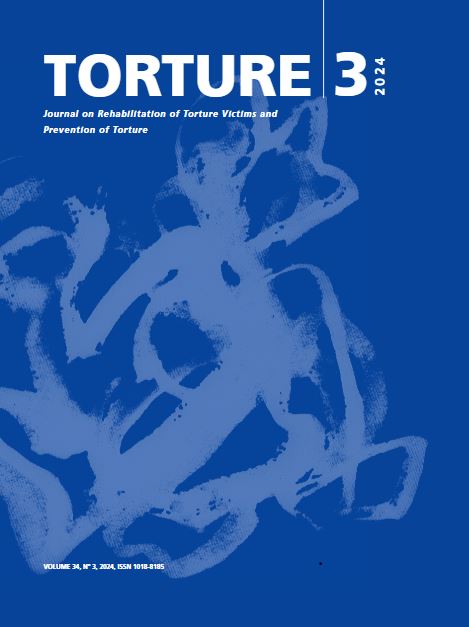Denial of abortion rights as a form of ill-treatment or torture
DOI:
https://doi.org/10.7146/torture.v34i3.152020Palabras clave:
torture, abortionResumen
The paper presents a review of the evolution of sexual and reproductive rights within the context of the international human rights framework.
Subsequently, an analysis is presented of the extant data on legislation by country, statistics on unsafe abortion and evidences on the relationship between abortion and mental health.
In the second section, the text reviews the legal grounds for two situations: firstly, the denial of health services in relation to the termination of pregnancy as cruel, inhuman or degrading treatment; and secondly, those cases in which the denial of abortion could constitute a violation of the Convention against Torture.
Consequently, the position of the relevant international bodies is examined, and the manner in which each assumption of the definition of torture is satisfied is analysed, as well as the significance attributed to each element by the various committees. This information is then used to present elements related to forensic documentation in accordance with the Istanbul Protocol.
Citas
Ambast, S., Atay, H., & Lavelanet, A. (2023). A global review of penalties for abortion-related offences in 182 countries. BMJ Global Health, 8(3). https://doi.org/10.1136/bmjgh-2022-010405
Biggs, M. A., Upadhyay, U. D., McCulloch, C. E., & Foster, D. G. (2017). Women’s Mental Health and Well-being 5 Years After Receiving or Being Denied an Abortion. JAMA Psychiatry, 74(2), 169. https://doi.org/10.1001/jamapsychiatry.2016.3478
Center for Reproductive Rights. (2022). Abortion Rights are Advancing Across the Globe. https://reproductiverights.org/wp-content/uploads/2023/08/CRR_WALM_SUPPLEMENT_new-8-31-23_FINAL.pdf
CHRHL. (2016). Gender Perspectives on Torture: Law and Practice. Washington College of Law. Center for Human Rights & Humanitarian Law. Anti-Torture Initiative. https://www.wcl.american.edu/impact/initiatives-programs/center/documents/gender-perspectives-on-torture/
David, H. P. (2011). The Prague 35 Years Later : Born Unwanted, Study. Reproductive Health Matters, 14(27), 181–190.
De Londras, F., Cleeve, A., Rodriguez, M. I., Farrell, A., Furgalska, M., & Lavelanet, A. (2022). The impact of criminalisation on abortion-related outcomes: A synthesis of legal and health evidence. BMJ Global Health, 7(12), 1–13. https://doi.org/10.1136/bmjgh-2022-010409
Foster, D. G., Biggs, M. A., Raifman, S., Gipson, J., Kimport, K., & Rocca, C. H. (2018). Comparison of Health, Development, Maternal Bonding, and Poverty Among Children Born After Denial of Abortion vs After Pregnancies Subsequent to an Abortion. 94612(11), 1053–1060. https://doi.org/10.1001/jamapediatrics.2018.1785
Foster, D. G., Biggs, M. A., Ralph, L., Gerdts, C., Roberts, S., & Glymour, M. M. (2022). Socioeconomic Outcomes of Women Who Receive and Women Who Are Denied Wanted Abortions in the United States. American Journal of Public Health, 112(9), 1290–1296. https://doi.org/10.2105/AJPH.2017.304247
Guttmacher Institute. (2022). Unintended Pregnancy and Abortion Worldwide. https://doi.org/10.5860/choice.47-1155
Latt, S. M., Milner, A., & Kavanagh, A. (2019). Abortion laws reform may reduce maternal mortality: An ecological study in 162 countries. BMC Women’s Health, 19(1), 1–9. https://doi.org/10.1186/s12905-018-0705-y
Meda, C.-L., & Hadi, S. T. (2017). Patriarchy, Abortion, and the Criminal System: Policing Female Bodies. Women & Criminal Justice, 27(1), 73–88. https://doi.org/10.1080/08974454.2016.1259601
Moloney, A. (2009). Abortion ban leads to more maternal deaths in Nicaragua. Lancet, 374(9691), 677. https://doi.org/10.1016/S0140-6736(09)61545-2
Ogbu‑Nwobodo, L., Shim, R. S., Vinson, S. Y., Fitelson, E. M., Biggs, A., McLemore, M. R., Thomas, M., Godzich, M., & Mangu, C. (2022). Mental Health Implications of Abortion Restrictions for Historically Marginalized Populations. N Engl J Med, 387(17), 1613–1618. https://doi.org/10.1056/NEJMms2211124
Prandini, M., & Erdman, J. N. (2022). Abortion rights beyond the medico-legal paradigm. Global Public Health, 17(10), 2235–2250. https://doi.org/10.1080/17441692.2021.1971278
Rocca, C. H. (2013). Women''s Emotions One Week After Receiving or Being Denied an Abortion in the United States. October 2019. https://doi.org/10.1363/4512213
Sifris, R. (2014). Reproductive Freedom, Torture and International Human Rights. Challenging the masculinisation of torture. Routledge.
Steinberg, J. R., Laursen, T. M., Adler, N. E., Gasse, C., Agerbo, E., & Munk-Olsen, T. (2019). The association between first abortion and first-time non-fatal suicide attempt: a longitudinal cohort study of Danish population registries. The Lancet Psychiatry, 6(12), 1031–1038. https://doi.org/10.1016/S2215-0366(19)30400-6
Webster, E. (2016). Interpretation of the prohibition of torture: Making sense of ‘dignity’ talk. Human Rights Review, 17(3), 371–390. https://doi.org/10.1007/s12142-016-0405-7
WHO, & HRP. (2022). Abortion care guideline. https://creativecommons.org/licenses/by-nc-sa/3.0/igo/deed.ru
World Health Organization. (2014). Clinical practice handbook for safe abortion. WHO. http://apps.who.int/iris/bitstream/10665/97415/1/9789241548717_eng.pdf
Zandberg, J., Rebecca, W., Visoki, E., & Barzilay, R. (2023). Association Between State-Level Access to Reproductive Care and Suicide Rates Among Women of Reproductive Age in the United States. 19104(2), 127–134. https://doi.org/10.1001/jamapsychiatry.2022.4394
Descargas
Publicado
Cómo citar
Número
Sección
Licencia
Derechos de autor 2024 Torture Journal

Esta obra está bajo una licencia internacional Creative Commons Atribución-NoComercial-SinDerivadas 4.0.
We accept that some authors (e.g. government employees in some countries) are unable to transfer copyright. The Creative Commons Licence Attribution-NonCommercial-NoDerivatives 4.0 International (CC BY-NC-ND 4.0) covers both the Torture Journal and the IRCT web site. The publisher will not put any limitation on the personal freedom of the author to use material contained in the paper in other works which may be published, provided that acknowledgement is made to the original place of publication.


